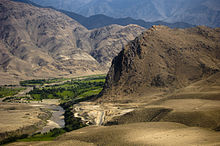The First Battle of Laghman was fought near Laghman in present-day Afghanistan, between the Ghaznavid empire under Sabuktigin and the Hindu Shahis under Jayapala in 988 CE. The Ghaznavids defeated the Hindu Shahis and Jayapala signed a treaty in which the Hindu Shahis paid tribute to Ghaznavids.[2][3]
| First battle of Laghman | |||||||
|---|---|---|---|---|---|---|---|
| Part of Ghaznavid campaigns in India | |||||||
 Present day Laghman | |||||||
| |||||||
| Belligerents | |||||||
|
| Hindu Shahis | ||||||
| Commanders and leaders | |||||||
|
| Jayapala | ||||||
| Strength | |||||||
| Unknown | |||||||
Background
editJayapala controlled the Laghman area. He heard traveler reports that Sabuktigin was encroaching on his dominions.[citation needed]
Battle
editJayapala advanced towards Ghazni and met the enemy near a place called Ghuzak between Ghazni and Lamghan.[4][5][6] The battle continued for days without either side giving way. A thunderstorm broke out and Jayapala was forced to sign a humiliating treaty making him pay tribute to Sabuktigin.[7][8][9][5][6]
Aftermath
editJayapala arranged a confederacy of army with the support of Kingdoms of Kannauj, Ajmer and Chandela to fight against Ghaznavids. But they were again defeated by Sabuktigin at Laghman.[7][5][10]
See also
editReferences
edit- ^ Nazim, M. (2014). The Life and Times of Sultan Mahmud of Ghazna. United Kingdom: Cambridge University Press. p. 36.
- ^ C. E. Bosworth. The Early Ghaznavids. p. 168.
- ^ Seth, Krishna Narain (1978). The Growth of the Paramara Power in Malwa. Progress Publishers. pp. 156–157.
- ^ Kumar, Raj (2008). History Of The Chamar Dynasty : (From 6Th Century A.D. To 12Th Century A.D.). Gyan Publishing House. p. 127. ISBN 978-81-7835-635-8.
- ^ a b c Martin, Robert Montgomery (1850). The British Colonies: Their History, Extent, Condition and Resources. London Printing and Publishing Company. p. 60.
- ^ a b Mishra, Yogendra (1972). The Hindu Sahis of Afghanistan and the Punjab, A.D. 865-1026: A Phase of Islamic Advance Into India. Vaishali Bhavan. p. 101.
- ^ a b Sen, Sailendra Nath (1999). Ancient Indian History and Civilization. New Age International. p. 342. ISBN 978-81-224-1198-0.
- ^ University Of Pittsburg Press U.s.a. (1961). Cultural History Of Kapisa And Gandhara. p. 47.
- ^ Bose, Mainak Kumar (1988). Late Classical India. A. Mukherjee & Company. p. 55.
- ^ Anthropos. Zaunrith'sche Buch-, Kunst- und Steindruckerei. 1984. p. 402.